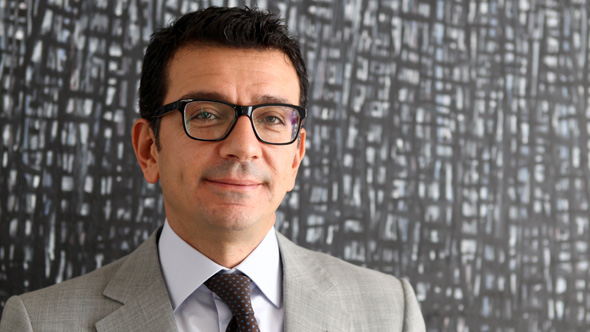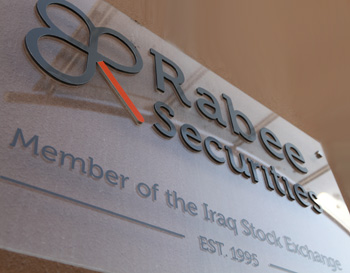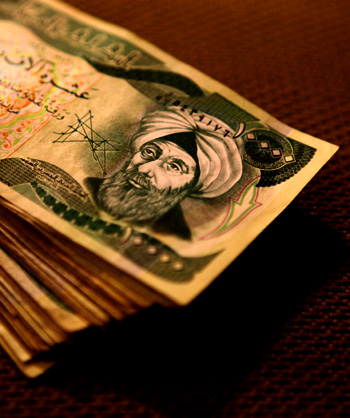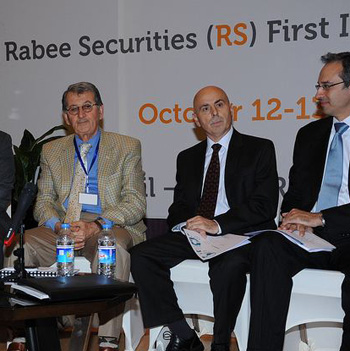Iraq’s Capital Markets | An Overview by Rabee Securities
Many investors come to Iraq and ask what they shall invest in while a better question would be what they should not invest in because Iraq is a vast land of investment opportunities. It nevertheless remains difficult to invest in Iraq as it is a very difficult place to operate in; a war-torn country where the financial knowledge equals almost to zero.

Many foreign investors have a very strong perception of Iraq nowadays; they perceive it as a frontier market; a risky destination with a combination of political and internal risks. When you meet these foreign investors, what is their main concern or worry regarding investing in Iraq?
Investors who invest in emerging markets, frontier markets or beyond understand these risks and it is actually what attracts them to Iraq. There is a risk perception, and the risk usually in these markets is mis-priced. So in a country like Iraq, where the mainstream news media is always negative, they are attracted because they want to see what the world might be missing. They are by nature contrarians. You can say that there are all types of investments and all types of theories, but most people who come to Iraq are contrarians and optimists; they are looking for niche markets, for higher yields and they are looking at the positive side of Iraq.
Iraq is a country with practically very little debt, with 30+ million people, with 60% of the population below the age of 20 and we might be the second or third country in hydrocarbon reserves in the world. Plus we have other strengths, as you may know Mesopotamia used to feed the region; we have good agriculture that could be developed and we have had now almost 30 or 35 years of zero development. Thus, we are starting from a low base.
Many investors who come to Iraq and look at Iraq, ask me “What shall we invest in, in Iraq?” and I say “There’s a long answer to that question because you can invest in everything, the better question would be: what should I not invest in?” because everything else is a fair game.
Today, there are very few countries positioned like Iraq where the growth over the next 5, 10 or 20 years is quite substantial, we have a good expansion potential. Thus, ones who are coming to invest here are trying to get in on the bottom floor of investment and they want to ride the wave.
You mentioned the better question is the contrary one: “What should I not invest in?” However, the reality on the ground is that 73% of what is traded on Iraqi stock exchange is banking, there are no industries. It is very difficult because of the bureaucracy.
No, I deal with a different type of investor; our main clientele are hedge funds and frontier market funds. These investors primarily invest in the stock market; so if you have a company in the stock market, they come, open an account with us and they buy your stock. Today that is the easiest way to invest in Iraq as a foreigner; it’s straight forward, there are no complications.
We also do investment banking; we have clients who are looking for private capital. That’s a lot more tricky, because that’s when as you said the bureaucracy, lawyers, corruption come into question very quickly. While on the other hand the stock market is quick, easy and painless for them to invest in. You mention 73%; actually the last count is that 80+% of the market cap of the stock market is in banks. That’s not too abnormal for emerging markets. What happens is you start having single events, where the market is transformed. For instance we are working on the listing of Asiacell, when that happens, then we will practically double the size exchange.
Many investors who come to Iraq and look at Iraq, ask me “what shall we invest in, in Iraq?” and I say “there’s a long answer to that question because you can invest in everything, the better question would be: what should I not invest in?”
For a stock market the important thing is that the entrepreneur starts to understand that it’s a good way to get capital. Today, a businessman knocks on the bank’s door and says “give me money” and they ask “Ok, how much assets/land do you have?”, “It’s valued at 10, we’ll give you 3”. That is not real banking, so we haven’t moved from that to “Ok, let me see your cash flow…” and on the other hand the businessman doesn’t think “I can sell some equity much cheaper than the debt I get”. He always thinks “If I sell equity now I will be giving away a portion of the profit later”, but when you explain in mathematical terms that actually this equity is much cheaper than borrowing at 12 or 13% he starts thinking about it.
Young stock markets need events; these events could be massive privatizations like what happened in England or Turkey: large companies that all of a sudden get the market and attract attention, like maybe in Iraq or Egypt.
So yes, it is difficult to invest in Iraq, if it wasn’t difficult you wouldn’t be talking to Rabee Securities, an Iraqi firm; you’d be talking to the Morgan Stanley or the Goldman Sachs. Iraq is a very difficult country to operate in, its still a war torn country, the financial knowledge in Iraq is zero; no one paid attention to finance. This is a difficult environment to work in and many days my colleagues and I wake up and we wonder if we’ve done the right thing, but then we get confirmation; we see that an investor or a businessman is satisfied, then we get a message from the stock exchange “thank you very much, you’ve done good” it keeps us going.
There are initiatives by the Kurdistan Regional Government to create their own stock exchange and they have contacted Dubai to help them.
For us any effort to encourage more investment is welcomed. Let’s talk about Kurdistan. After many models Iraq has today a federal model, which I believe many countries reach in the end. You have people who are different but living in the same geography that was carved out for them, so they have to live together. I am a Kurd and I’m Iraqi, I was born and raised in Baghdad. We are lucky today in Kurdistan because we have had a longer period of peace, which has actually allowed us to develop the area. This square mile we are sitting in, is probably one of the most developed in Iraq today. Also, we had a wise regional government that actually believed in the private sector much more than the central government. The central government had a long legacy of believing that everything should be controlled, that businesses should not all go to the private sector, that electricity should be produced by the government, that telecommunications should be provided by the government etc.
The world has moved very, very far away from that government-control model and an entrepreneur or a businessman is probably much more likely – if he is given the opportunity – to produce better results than the government. So Kurdistan realized that very quickly, that’s why you see we have electricity, in Erbil almost 24 hours a day. Actually, if the plans go ahead as they are today, the region will start exporting electricity to the rest of Iraq. We have cement factories here that are producing the majority of the cement in Iraq and they aren’t owned by the government. The government has nothing to do with them; they are owned by Lafarge and a private group here. Two of the mobile operators in Iraq have their headquarters in Kurdistan – one is in Erbil (Korek Telecom) and the other in Sulaymaniyah (Asiacell). The region has done tremendously well in capitalizing on the upswing in the oil sector. Today almost all major oil companies are here. These are all very positive events in this region. I think that foreigners today realize that they can actually do business in Kurdistan. They also can do business in Kurdistan for the rest of Iraq.
The Kurdistan region in Iraq is actually very small in population, so today if you wanted to open a factory here; for example a cement plant and you thought that it was just for this region, I don’t actually think you would do it because it’s so small, but if you think of a population of 30 million then you get encouraged to open your business. Many foreigners I talk to who want to come here aren’t thinking about opening a factory in Erbil just for the population of Erbil – no one thinks like that – it’s about the whole population of Iraq.  The region is becoming a trampoline or bouncing ball – you can reach the rest of the country from Kurdistan – and that is important for Kurdistan and Iraq.
The region is becoming a trampoline or bouncing ball – you can reach the rest of the country from Kurdistan – and that is important for Kurdistan and Iraq.
Of course the picture is not always positive when you have a very rapid massive growth. When you have a large injection of capital, you start seeing negative signs especially in resource-rich countries. It is very difficult for a government to not start touching resources. We sometimes do in-house research just to see how things work. We took two snapshots in the world where oil prices were very high: 1980 and today. The resource-rich countries with sizeable populations – I’m not talking about Qatar or UAE but countries like Saudi Arabia or Venezuela – had a higher percentage of the world GDP in 1980 than they do today and with much smaller populations. We can’t talk about Iraq because Iraq went through so many wars. Our GDP as a percentage of the world GDP has been devastated. Had we kept just the percentage we had in 1980, Iraq would be 3 times larger economically than it is today. What was surprising was that in MENA our combined share is lower. The only two countries we could find that managed to break that commodity curse were Norway and Chile. When I tell my friends here that gasoline prices in an oil producing country like Norway are amongst the highest in the world, they think that something is wrong. How can they produce so much oil and yet have higher prices? From the beginning of the 70s, when oil was discovered in Norway, until today, they have accumulated US $680 billion, which for the population of Norway is probably enough to live on by investing it for the rest of humanity! None of our countries were able to achieve that. Chile started a pension system that should be a model for Iraq. This also shows you that you should not spend your money today, which is very difficult for a country coming out of 30 years of war. Everybody today asks “what does Iraq need?” and I think the last thing we need is money, per se. What we need is intelligent money, and so you have to create the environment to attract that intelligent money. By some accounts, we are going to need $600 billion of investment in the country in this decade alone. You can make any calculations you need, we are not going to produce $600 billion, so that means we have to bring in more investment, we have to save more and we have make cuts. These are very dangerous political decisions which people are not thinking about.
Let’s finish by talking about Rabee Securities itself, your base is in Baghdad and you have other branches…
Yes, we opened 2 branches, firstly in Erbil and then in Sulaymaniyah. We opened them for two reasons; firstly we need a presence here for the population of the region. Secondly, we found it very difficult to take foreign investors to Baghdad but we found it much easier to bring them to Erbil and Sulaymaniyah, even the companies in Baghdad understand that, so we needed a base here. Finally, most of our investment banking activities today are in Kurdistan, they aren’t in the rest of Iraq yet, so it is crucial for us to be here, close to the customer.
You are a kind of pioneer in Iraq in terms of the structured financial product.
Pioneer is a nice word. We are mavericks! We can’t be termed anything but mavericks, we all think alike in this firm. We are 25 employees. We have only 3 foreign employees, all Turkish, because we have a representative office in Turkey. The rest are all Iraqis born and raised here, some got their education abroad and came back. We are trying to create an Iraqi financial institution. How successful will we be? Only time will tell.